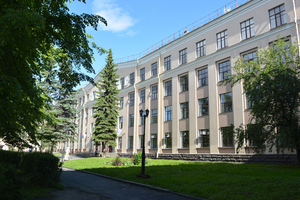Focus on local and microhistorical research
Within the framework of the 72nd All-Russian (with international participation) scientific conference of students and young scientists of PetrSU, the 13th meeting of the scientific section “Local and Microhistorical Research”, organized by the Research Laboratory of Local and Microhistory of Karelia Humanitarian Innopark, was successfully held.
For 15 years (since 2006), ILLMIK has been organizing the work of the section, which brings together on its site researchers specializing in the study of small territories and populations, everyday life and the fate of the “little man”. Traditionally, scientists and young researchers from the University of Eastern Finland (Joensuu campus , abbr. UEF) and Tver State University (Tver State University) – long-time partners of the laboratory -take part in it.
This year, the sections of the conference were organized online on the ZOOM platform, which, as noted by the participants and leaders of the section, did not in any way affect its scientific and research components. Another long-standing tradition of the section was not violated either: the winners were determined taking into account the points given by the speaker by all the participants, including the audience and guests.
10 reports were heard on a variety of topics: from the issues of education in the school of the Finnish city of Lieksa in the 1940-50s. before studying the family archive of residents of the village of Nyukhcha (Belomorsky district of Karelia).
The winner of the conference was Maria Karpova, postgraduate student of Tver State University. Her report, performed under the guidance of Associate Professor Yu.V. Stepanova, was dedicated to Russian drawings of the 17th century as a source on the history of the cultural landscape.
Second place was shared by Nikita Mendeleev, a master’s student of Tver University, with a report “Topography of the city of Tver in the 17th century” and Polina Voronina, administrator of the PetrSU Humanitarian Innopark, a UEF graduate student, who devoted her research to the analysis of the reflection on the pages of the Finnish press of the 1923 amnesty to the Karbezhians.
In third place is a report by Ulyana Milyutina, a master’s student at the Department of Foreign History, Political Science and International Relations, IIPSN , co-authored with Vladislav Stukalov, a volunteer researcher at ILLMIK, focusing on the documents of the Dolinins family, residents of the ancient Pomor village of Nyukhcha. Documents for young researchers is made possible through their participation in the expedition, which took place in the framework of the interdisciplinary project ” Karelian Pomorie: vocabulary and onomastics (XVI-XXI centuries). ” The project, competitive financing of Russian Federal Property Fund, performed jointly by the two laboratories – Laboratory lingvokraevedeniya and language ecology(head – E.R. Guseva) and ILLMIK (head – I.A. Chernyakova). On the example of the analysis of various payment notices, certificates, obligations and other documents preserved in the family archive, it was convincingly shown that financial documents can be used in the study of both the history of an individual family in particular, and the history of a settlement as a whole. The authors express their gratitude to the creator and permanent curator of the Museum of Pomor Life “Trash Barn” Nadezhda Sergeevna Semenova for the opportunity to work with the documents, as well as invaluable help in preparing the report.
The reports of Anastasia Mikhailova, a master’s student at the IIPSN, “Korelsky uyezd (Keksholm flax) of the 17th century in Russian and Finnish historiography” (scientific adviser – IA Chernyakov) and Daniil Golyaev, a third-year student of the IIPSN, “The system of border outposts and fortresses in the north west of the Russian state in the 17th century ”(scientific supervisor – ED Suslova) were recommended for revision to articles for publication in the student scientific electronic journal of PetrSU Stud Arctic Forum .
The organizers and participants would like to thank the administration of PetrSU for organizing the conference.

